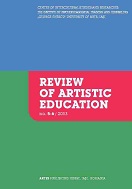FEMALE MUSIC MAKING IN THE NINETEENTH CENTURY
FEMALE MUSIC MAKING IN THE NINETEENTH CENTURY
Author(s): Rossella MarisiSubject(s): Music
Published by: Editura ARTES
Keywords: women’s status in society; women musician; music academic education
Summary/Abstract: Women’s studies, a relatively new academic field, examine the way society creates, patterns and rewards women’s status in society. Research has shown that, in the course of time, women have been led to identify and perceive their role through gender-oriented education: either in private households or in schools, the subjects taught to girls were different from those taught to boys. Music, in particular, was considered strongly linked with femaleness. Being trained in music education, girls and women of the upper class became during centuries active participants in all aspects of musical life, performing and composing music; nevertheless, often their endeavors remained unknown and unpublished, being considered amateur accomplishments, destined to be eclipsed by those of highly trained “professional” male musicians. This study strives to highlight the principal characteristics of the nineteenth century society and culture, which introduced compulsory education for aristocratic and bourgeois girls, but denied them the chance to have a career. Nevertheless, some highly talented young women became renowned performers, composers and music teachers: among them Maria Szymanowska, Louise Farrenc, Léopoldine Blahetka, Fanny Mendelssohn, and Clara Wieck.
Journal: Review of Artistic Education
- Issue Year: 2013
- Issue No: 05+06
- Page Range: 18-24
- Page Count: 7
- Language: English
- Content File-PDF

